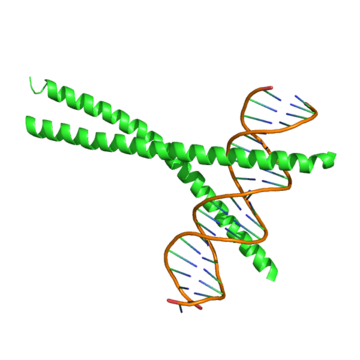CCAAT/強化子結合蛋白α,簡稱C/EBP-α或CEBPA是一種由人類CEBPA基因編碼的蛋白質。[6][7]CEBPA是參與某些血球分化的轉錄因子。[8]有關基因強化子中的CCAAT結構基序和CCAAT/強化子結合蛋白的詳細資訊,請參見特定頁面。
Quick Facts CEBPA, 識別號 ...
Close
這種無內含子基因編碼的蛋白質是一種bZIP轉錄因子,它可以作為同源二聚體與某些啟動子和基因強化子結合。它還可以與相關蛋白C/EBP-β和C/EBP-γ以及不同的轉錄因子如c-Jun形成異二聚體。編碼的蛋白質是脂肪細胞生成和這些細胞中脂質積累以及肝臟中葡萄糖和脂質代謝的關鍵調節因子。[9]該蛋白質已被證明與啟動子結合併調節編碼瘦蛋白的基因的表現,瘦蛋白是一種在體重穩態中起重要作用的蛋白質。此外,編碼的蛋白質可以與CDK2和CDK4相互作用,從而抑制這些激酶並導致培養的細胞停止分裂。[10]此外,CEBPA對骨髓譜系定型至關重要,因此對於正常成熟顆粒球的形成和異常急性骨髓性白血病的發展都是必需的。[11]
CEBPA突變可分為兩大類。一類突變通過改變其COOH末端鹼性白胺酸拉鏈結構域來阻止CEBPA的DNA結合。另一類突變破壞了CEBPA的NH2末端的轉譯。 CEBPA突變導致CEBPA活性降低,有助於骨髓前體的轉化。[12]
CEBPA已被證明與週期素依賴性激酶2相互作用[13]和週期素依賴性激酶4。[13]
CEBPA的突變已被證明與成人和兒童急性骨髓性白血病患者的良好結果有關。[14]
急性骨髓性白血病的特徵在於造血祖細胞的遺傳異常。這包括原始細胞的過度增殖,以及阻止顆粒球的造血。已經表明,抑制CEBPA表現和阻斷CEBPA會阻止骨髓祖細胞的分化。出於這個原因,CEBPA在顆粒球分化過程中的作用和CEBPA作為腫瘤抑制基因的作用在急性髓細胞白血病的預後中至關重要。[15]
CEBPA在未成熟顆粒球的分化中非常重要。CEBPA基因的突變已被證明在急性骨髓性白血病患者的白血病發生和預後中起關鍵作用。在最近的研究中,在7%到15%的急性骨髓性白血病患者中發現了CEBPA突變。在這些急性骨髓性白血病患者中看到的三種不同類型的突變包括種系N末端突變、N末端框移突變和C末端突變。這些突變最常見於急性骨髓性白血病M1或M2。許多報道將CEBPA突變與急性骨髓細胞白血病的良好結果聯繫起來。這是因為這些突變可能會導致這些患者的分化停滯。有CEBPA突變的患者比沒有突變的患者有更長的緩解持續時間和生存時間。[12]因此,CEBPA突變的存在與疾病進展的更有利過程直接相關。[16]
最近顯示,CEBPA遠端啟動子區域的表觀遺傳修飾導致胰腺癌細胞、肺癌和頭頸部鱗狀細胞癌中CEBPA表現下調。[17][18]
最近的一項研究發現,較高水平的CEBPA甲基化與治療反應成正比。完全反應率與CEBPA甲基化水平成比例增加。出於這個原因,有人提出CEBPA的甲基化可能是急性髓細胞白血病預後中非常有用的生物標記。[19]
Szpirer C, Riviere M, Cortese R, Nakamura T, Islam MQ, Levan G, Szpirer J. Chromosomal localization in man and rat of the genes encoding the liver-enriched transcription factors C/EBP, DBP, and HNF1/LFB-1 (CEBP, DBP, and transcription factor 1, TCF1, respectively) and of the hepatocyte growth factor/scatter factor gene (HGF). Genomics. July 1992, 13 (2): 293–300. PMID 1535333. doi:10.1016/0888-7543(92)90245-N. Cao Z, Umek RM, McKnight SL. Regulated expression of three C/EBP isoforms during adipose conversion of 3T3-L1 cells. Genes Dev. October 1991, 5 (9): 1538–52. PMID 1840554. doi:10.1101/gad.5.9.1538  .
. CEBPA. Genetics Home Reference. April 20, 2016 [April 25, 2016]. Olofsson LE, Orho-Melander M, William-Olsson L, Sjöholm K, Sjöström L, Groop L, Carlsson B, Carlsson LM, Olsson B. CCAAT/enhancer binding protein alpha (C/EBPalpha) in adipose tissue regulates genes in lipid and glucose metabolism and a genetic variation in C/EBPalpha is associated with serum levels of triglycerides. The Journal of Clinical Endocrinology & Metabolism. 1 December 2009, 93 (12): 4880–4886. PMID 18765514. doi:10.1210/jc.2008-0574  .
. Lin LI, Chen CY, Lin DT, Tsay W, Tang JL, Yeh YC, et al. "Characterization of CEBPA mutations in acute myeloid leukemia " most patients with CEBPA mutations have biallelic mutations and show a distinct immunophenotype of the leukemic cells. Clin Cancer Res. 2005, 11 (4): 1372–9. PMID 15746035. doi:10.1158/1078-0432.ccr-04-1816  .
. Wang H, Iakova P, Wilde M, Welm A, Goode T, Roesler WJ, Timchenko NA. C/EBPalpha arrests cell proliferation through direct inhibition of Cdk2 and Cdk4. Mol. Cell. October 2001, 8 (4): 817–28. PMID 11684017. doi:10.1016/S1097-2765(01)00366-5  .
. Ho PA, Alonzo TA, Gerbing RB, Pollard J, Stirewalt DL, Hurwitz C, Heerema NA, Hirsch B, Raimondi SC, Lange B, Franklin JL, Radich JP, Meshinchi S. Prevalence and prognostic implications of CEBPA mutations in pediatric acute myeloid leukemia (AML): a report from the Children's Oncology Group. Blood. June 2009, 113 (26): 6558–66. PMC 2943755  . PMID 19304957. doi:10.1182/blood-2008-10-184747.
. PMID 19304957. doi:10.1182/blood-2008-10-184747. Lin TC, Hou HA, Chou WC, Ou DL, Yu SL, Tien HF, et al. CEBPA methylation as a prognostic biomarker in patients with de novo acute myeloid leukemia. Leukemia. 2011, 25 (1): 32–40. PMID 20927134. doi:10.1038/leu.2010.222  .
. El-Sharnouby JA, Ahmed LM, Taha AM, Kamal O. Prognostic significance of CEBPA mutations and BAALC expression in acute myeloid leukemia Egyptian patients with normal karyotype. Egypt J Immunol. 2010;15:131–143.
Tada Y, Brena RM, Hackanson B, Morrison C, Otterson GA, Plass C. Epigenetic modulation of tumor suppressor CCAAT/enhancer binding protein alpha activity in lung cancer. J Natl Cancer Inst. 2006, 98 (6): 396–406. PMID 16537832. doi:10.1093/jnci/djj093  .
. Bennett KL, Hackanson B, Smith LT, Morrison CD, Lang JC, Schuller DE, et al. Tumor suppressor activity of CCAAT/enhancer binding protein alpha is epigenetically down-regulated in head and neck squamous cell carcinoma. Cancer Res. 2007, 67 (10): 4657–4664. PMID 17510391. doi:10.1158/0008-5472.can-06-4793  .
. Lin TC, Hou HA, Chou WC, Ou DL, Yu SL, Tien HF, et al. CEBPA methylation as a prognostic biomarker in patients with de novo acute myeloid leukemia. Leukemia. 2011, 25 (1): 32–40. PMID 20927134. doi:10.1038/leu.2010.222  .
.
- Sladek FM, Darnell JE. Mechanisms of liver-specific gene expression.. Curr. Opin. Genet. Dev. 1992, 2 (2): 256–9. PMID 1638120. doi:10.1016/S0959-437X(05)80282-5.
- Marcucci G, Mrózek K, Bloomfield CD. Molecular heterogeneity and prognostic biomarkers in adults with acute myeloid leukemia and normal cytogenetics.. Curr. Opin. Hematol. 2005, 12 (1): 68–75. PMID 15604894. S2CID 6183391. doi:10.1097/01.moh.0000149608.29685.d1.
- Leroy H, Roumier C, Huyghe P, Biggio V, Fenaux P, Preudhomme C. CEBPA point mutations in hematological malignancies. Leukemia. March 2005, 19 (3): 329–34. PMID 15674366. doi:10.1038/sj.leu.2403614
 .
.





